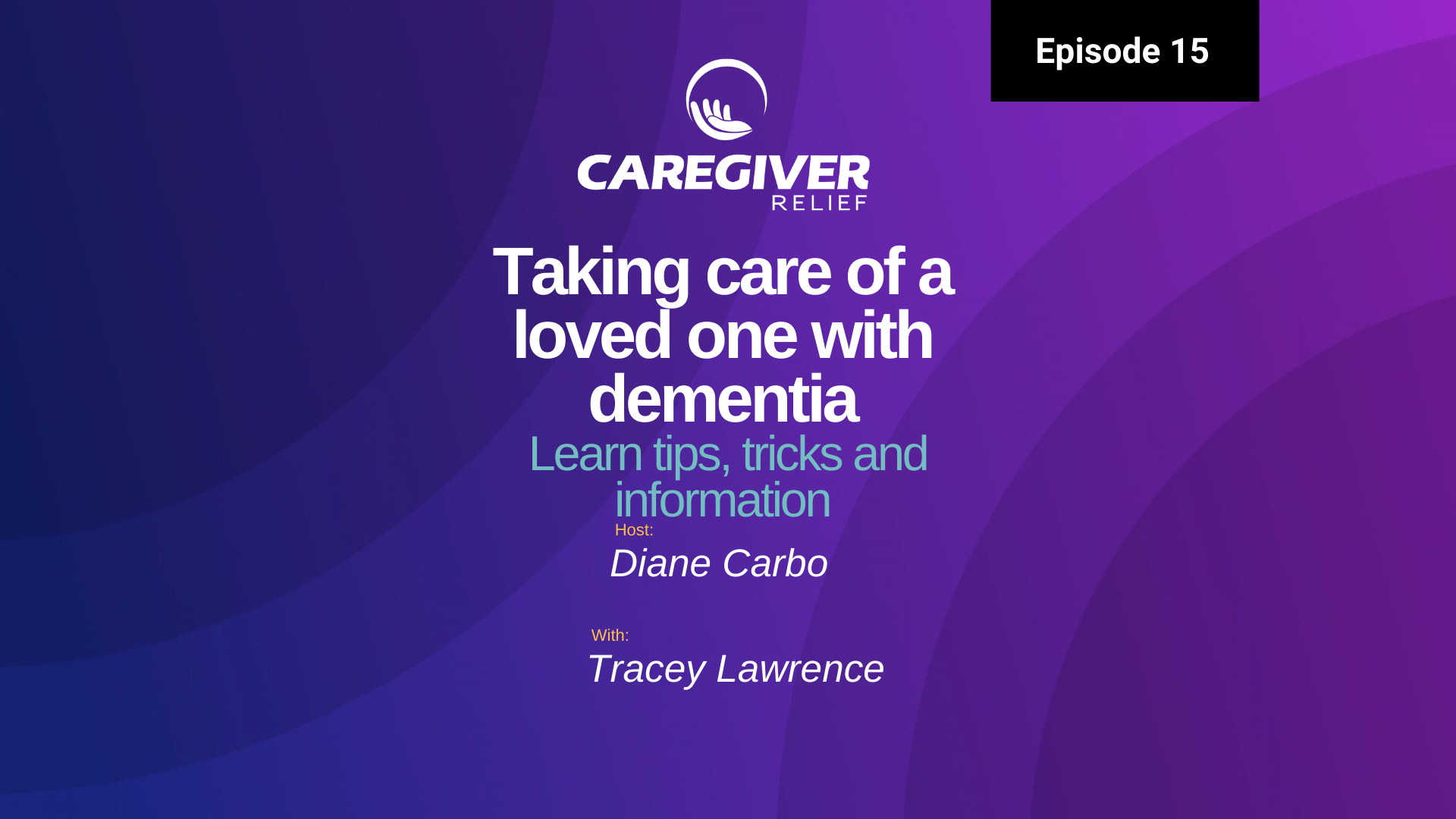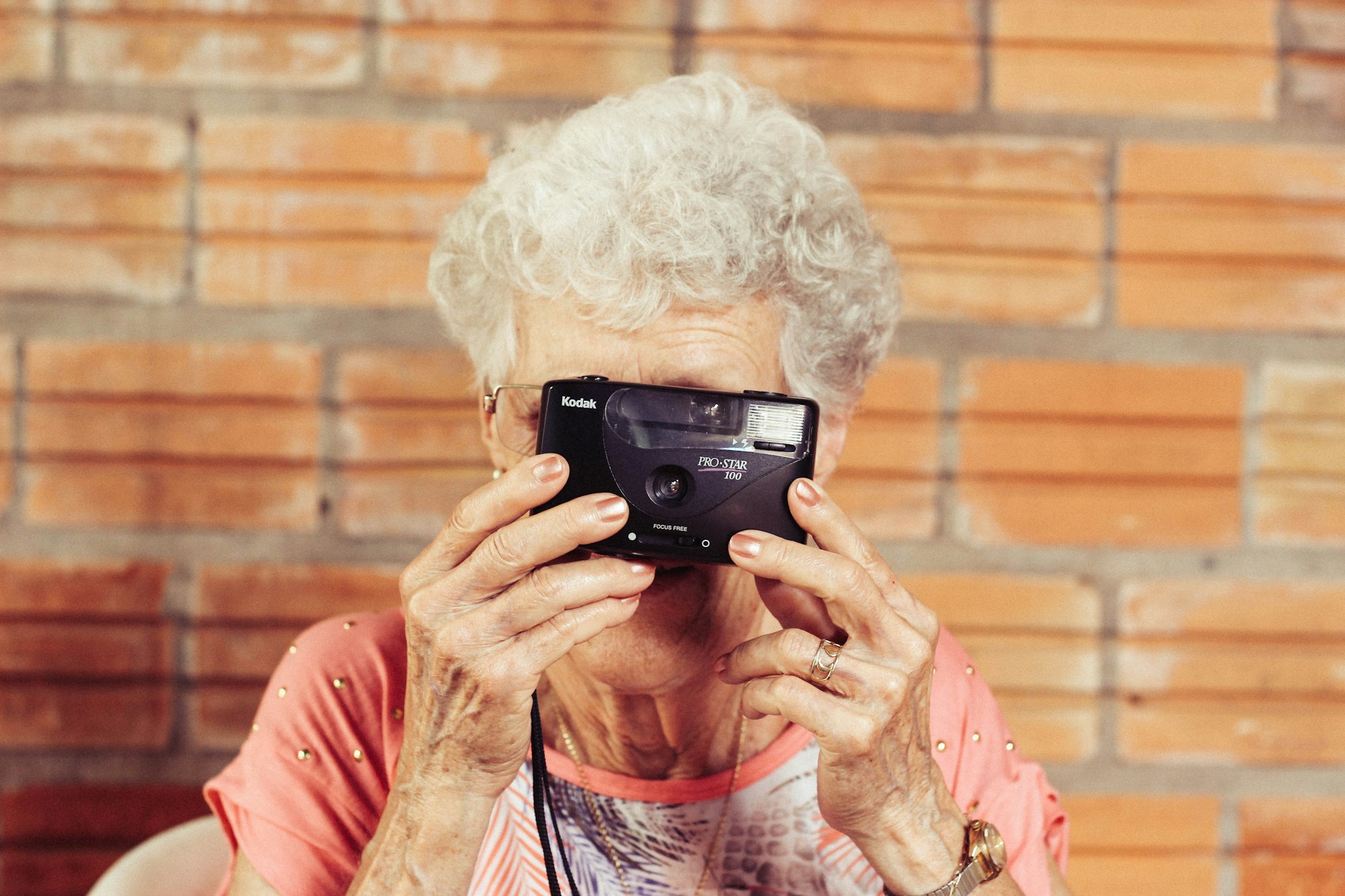Taking care of a loved one with dementia with Tracey Lawrence - Episode 15

Learn tips, tricks and information of the challenges caregivers with dementia face.
Diane Carbo: Hi, this is Diane Carbo with caregiver relief and today I have Tracey S Lawrence with me. She’s the founder of grand family planning and she’s written the ground breaking book dementia sucks. Tracy, I’m excited to have you here today and that’s what we’re going to discuss today. The challenges of caregiving, dementia sucks.
Tracey Lawrence: Thanks, Diane. It’s great to be here I’m delighted to to be talking to you about this this very thorny subject and it’s it’s funny and it’s not so funny of course, but the thing that I’ve learned is that most people who’ve been through watching a loved one deteriorate, they all know that, this is a terrible disease,. I’ve also been very fortunate in that. Both of my parents who did succumb to dementia also had a tremendous sense of humor . That was very helpful in getting through because there at times, what all, it was really heartbreaking to watch what they were going through. They were also, they were still able to laugh and that was extremely helpful.
Diane Carbo: Yeah, you either have the best or the worst or sometimes the best and the worst qualities of a person present themselves during the disease process depending on the type of dementia they have, and the part of the brain that’s affected. When they still have that sense of humor and can express it, it’s fun. It makes the day so much easier becauselaughter releases hormones and it makes us feel better.
Tracey Lawrence: Yes. Yes. And, it’s so much better to laugh than to cry.
Diane Carbo: Those are necessary emotions.
Tracey Lawrence: Yeah . But listen, we all know there’s nothing better than a good cry from time to time, the day to day, to be able to just have a good laugh about something and, and look, the people we love who developed cognitive decline, even if they can’t remember your name or if they’re confused about who you are, they still generally know that you have a relationship and they can be reminded of instances and the connections can still be made . Something that I like to offer people also is that, dementia is not linear, which is to say that, if somebody gets a diagnosis, they say they start losing their memory. And it’s usually the short-term memory is usually a first to go. They may still have a lot of really good days where they have a lot of clarity and they’re extremely lucid and high functioning and even after they may have a, a period where they suddenly take a bad term.
Tracey Lawrence: They may return, that’s one of the reasons that I say dementia sucks because it you’re always on quicksand. You never know. Who you’re going to be talking to on a given day, you don’t know who who’s going to show up. You have to be flexible and you have to be ready to embrace. Whoever does show up and have reasonable expectations of that person. So many people who are beginning their journey and just starting to grapple with dementia, really don’t understand. What it is that they’re up against. They don’t understand what their loved one is experiencing.
Tracey Lawrence: They don’t understand, they’ll get upset with them because they don’t respond the way you would expect them.
Diane Carbo: , exactly. I have a situation where I was called in by a family. They had a sister who was very high functioning, very bright, older woman young at heart, for sure. Working In a high power position and they always saw her at holidays because she was working all the time. She was in her late sixties. She would always come to them. Something happened and she couldn’t come to them and they ended up at her and what they found shocked them. She must have had hundreds of post-it notes. With messages to herself all over the place. She was able to hold it together to go to work, to function. I’m sure she had issues at work that people were noticing, but it wasn’t enough to alert anybody at the time or was it people just pass it off from whatever it might be stress or whatever.
Diane Carbo: When I was called in because they realized that there was definitely something going on, but she was always able to hold it together enough that she could hide it. And I think that’s something that family members don’t realize. A person with dementia is in the early stages. And some, it can be very slow. . It could be 20 it could even be 30 years from the time they diagnose something going on till a person passes. One of the things that I find that a lot of my clients complain about is they didn’t show any change in the mini mental status, but they, the family members that are with them all the time, see things happening, but they been able to do it well enough.
Diane Carbo: That it’s just a part of the brain that’s been effected and how high functioning some people are that they can hide their cognitive deficit for a long time.
Tracey Lawrence: Absolutely. And then, different kinds of dementia present differently. Like for instance, my dad had vascular dementia and one of the most frustrating things about his dementia was his symptoms kept changing because for those who aren’t aware. Vascular dementia is it creates strokes or what they call mini strokes. And there was a more technical term, but since I’m not a doctor, I’m not going to search for it right now.
Tracey Lawrence: But what’s happening is that different parts of the brain or being affected at different times and you never know. When, one of those strokes is going to go off. Someone may, you may be having a conversation with someone and they seem perfectly rash, rational, and lucid and all of a sudden, like in my father’s case, he started his speech began to slur., in over a matter of time, in the same day, it cleared up again. So, you really don’t know what’s going to happen at any given time other types of dementia or, or more cumulative. When you’re talking about things like Alzheimer’s disease, where you have plaque building up in the brain and different parts of the brain are affected the concentration of the obstruction. Will impact a particular portion of the brain , that is a controller of different functions. So you can be a little more predictive, right. Or there’s a little bit more consistency. But then just for fun some of, someone can develop psychosis and what a lot of people don’t know about Alzheimer’s disease in particular is that the people who have it can become violent and it’s shocking. When someone I knew formerly was a very demure person. Like my mom was all of a sudden they become combative. My mother actually got thrown out of rehab for threatening people with knives. Yeah, she got she got into the the dining room where they in the rehab facility where she was receiving physical therapy and they had steel knives within a, like a little serrated edge. The likelihood that she could actually hurt somebody. With one of those things was pretty, pretty remote, but, the behavior was alarming enough that they were afraid that she would hurt herself or hurt, another patient or one of the staff. And she was really agitated and she felt threatened and she wanted to protect herself. And, I got called and when I went to see her at the hospital, because they called the police. And had her show now. They could not handle her on their own and I couldn’t get there fast enough to intervene. And as I’m on my way over to the rehab, they called me and they said, no, she’s not here anymore. She’s over at Chilton hospital,, you can find her there senior behavioral health unit. Actually she was moved to a psychiatric ward.
Diane Carbo: Yeah. . The behavioral health unit. Yeah, because I did see your behavioral health and I think one of the most frustrating things for family members is when they get to that stage. Not all of them do, but a lot of them do, they end up in a senior behavioral health unit, hopefully run by a psychiatrist that can work with them on adjusting medications and have the right behavioral approaches. I know in our unit, we had a padded room . , we had very low lighting. There was a mattress, a very low mattress, everything was padded. Because we would get people that would attack us and it’s not just the physical, there’s also a sexual components that can happen with some men and women get very hypersexual and that’s very disturbing and upsetting to many family members as well.
Tracey Lawrence: Yeah. My mom. Very hyper let’s say flirtatious phase.
Diane Carbo: . Yes. I had a a pastor’s wife they’ve given to their church for forever. They ran the church and stuff. Lovely little lady that all she would do is one stage of her disease was she was dropping F bombs all day long and people stopped coming because they are offended. I’m sure every time she said it was one time she held back. When she wanted to say, god bless her. God bless her.
Tracey Lawrence: My mom was at that same rehab facility. She was in a semi-private room with a lovely woman who didn’t have to. Very very calm lovely person and my mom told me when the first time I went to visit her at this rehab center, she was at lunch and her roommate was in the room. So I went to the room and I asked her roommate where she goes, she told me that she thought mom was in the dining hall. So I went to, and I found her and and I told my mom, I said, yeah, your roommate told me where to find you. And she’s oh that one turns tricks all night. And I said what she’s telling me and I’m like, mom, and she’s no, Nope. There, she keeps me up all night. The traffic in that room. I know people who like, who have these stories and and their families don’t know or unaccustomed to things, I had another friend who, when he first transferred his mother to, and she had she was in cognitive decline as well. Told my friend that she’d been raped.
Diane Carbo: Yeah. I’ve had these before.
Tracey Lawrence: Yeah. Yeah. My friend didn’t know what to do, cause I. What do you do? She’s telling the truth, is she not telling you the truth? What do we do? And these are all things that come up. You have to.
Diane Carbo: Sometimes those were suppressed. And I can tell from some other instances that I’ve had, where women have done that they have held something in their long-term memory. Forever that they didn’t share with anybody or if they did, it was very few people and they were victims of a sexual assault that they never reported, whether it was a family member or an acquaintance or whatever. That is something sometimes that happens too. , I’ve heard this several times in my course of my nursing and people start to ask questions and you just don’t know what to believe, but the first thing they do is they investigate everybody, the staff, everybody, when those are situations.
Tracey Lawrence: I’ve heard lots of those stories. It look, there’s actually an in my book. I talk about how, it’s the old Stephen stills song love the one you’re with people find comfort in the company of others. And if you’re with isn’t exactly the person you would like them to be, they just turn them into that person. The level of creativity is really impressive.
Diane Carbo: There’s a downside to this because we all need to be touched and we all need to be involved. And the families of the mother or the father or whoever, if a woman is the mother is sleeping around with everybody in the building, because not that she’s sleeping or she’s just climbing in bed and hugging and whatever, having an infatuation with another man, it really can be upsetting to the family members of those individuals one of the things that I have to remind my clients when they get upset because the nursing home or the memory care unit is going to call and cattle and stuff. Mom was in bed with somebody or my your husband or your father was found in bed with somebody else. It doesn’t even mean they were even being sexual. They were just maybe snuggling or canoodling or whatever for comfort sometimes and we have to remember that. People with dementia are living in the moment. They are truly just in the moment. They are not thinking about the past because they’ve lost that part of them. A lot of it, and they definitely can’t think of the future. So all they have is the very present. And Maslow’s theory of needs, if you’re hungry, you can’t feel love, a hierarchy of needs. You want to get fed and cleaned and dried and then loved. And until you can go on to being a better person. They’re stuck just meeting their needs. And that’s something that people don’t understand as well. Just like they don’t understand the negative, challenging behaviors. They don’t understand that sometimes the hypersexual is not something that they can control nor is the wandering into somebody else’s bed.
Tracey Lawrence: Yeah. Yep, sure. And then of course, if the person in question is still legally married to someone so Hertz to maintain a balanced view of that. If you’re, if your mom has dementia and she’s cheating on your dad, but, she doesn’t even know that your dad is sad anymore.
Diane Carbo: Yeah exactly.
Tracey Lawrence: A difficult situation. And I also, in part why, people who. Are in, in a relationship or in a marriage where one person, the other person is in such peril because the stress of having to care for or be concerned with the with the wellbeing of a person who no longer recognizes you or interacts with you as the partner that they’ve always been to you it’s an awful situation.
Diane Carbo: I have a client they’re both in their late seventies. He has he’s now in the middle stages of dementia . She is legally blind. She can still see and do a lot, but it’s just shadows amazing stuff on the computer. They’ve only been married 13 years and she sat and showed me their wedding ceremony. He came from Scotland. She’s from here, they got married in Florida and then moved out west and now they’re in Myrtle beach and it’s amazing to me. She saw things. She hadn’t really known it. They’d been dating for four years internationally and stuff, but, and we spent quite a lot of time together. She saw bits and pieces of things that could have been diagnosing dementia, but she didn’t realize it. this last year with COVID, he’s deteriorated dramatically as far as his cognitive status she’s a hundred percent caring for him. They had this dog that she really doesn’t want because it’s a challenge because she’s high maintenance dog and she only has him because of him, but he doesn’t even remember the dog’s name . He has what they call expressive aphasia. He’s not able to, and you could see this from his wedding pictures and his videos that he’s always very expressive, man. I told him he Could have been in the movie, the mask, what you carry, because the way he makes faces all the time and smiles and stuff, but he can’t express himself. So he looks at you any tries to express himself through him. Face his emotions. He rarely speaks and when he does speak it’s always a surprise to me and he’ll give me a good response and I’m like, oh, wow. But he’s now to the point where. He’s not able to drive this last year. It’s just really all the isolation stuff. Really. He’s done some stair-stepping and where he’d go down and then maintain and go down and may take. It’s difficult. She’s trying to keep him at home. She is reluctant to have outside sources. She’s reluctant to consider assisted living or independent living . That they need to move closer to her family, because he’d have so much more support and it would be good for her because one of the things, caregivers of people with dementia, and this is another reason why sucks is the stress causes illness. And if physical, emotional, and mental illness in the caregiver, Yes, and yes, exactly.
Diane Carbo: Exactly, and the statistics are not very good in favor of the caregivers, somebody with dementia, it’s like what is it? 60 is a 63% of the spouses die before the person that they’re caring for does.
Tracey Lawrence: Yes. And it’s horrifying and frightening. And, for people who have couples like that in their lives, they really need to pay attention because if they don’t they’re going to get a phone call and they’re going to have to take care of somebody who is demented without any of them backup information that was resident in the mind of the person who was taking care of them
Diane Carbo: Coping a way to cope is being in denial. These spouses are in denial and I really I worry about this woman and her husband, because she’s got high blood pressure. She’s losing her sight. She’s been diabetic for forever. She’s got a lot of things and the stress she’s living with and he’s just starting to wander. It is traumatizing. One point I wanted to make to people is there is a word it’s habilitation, not rehabilitation. And when a person with dementia. Loses a function like they’re unable to express themselves. They’re unable to reach for something not able to follow a command. Multiple step command . That means that’s a function they’re going to lose. They will not be able to rehab and relearn it a different way and that’s because their brain does not, your neural pathways are no longer connecting. In fact, what we’re seeing as a person with dementia has is brain cell death over time.
Tracey Lawrence: Yes and once that happens, the most, I think the most frustrating thing for so many of us is that, are these people with dementia can no longer learn it. Because learning is based on being able to remember, and if your short-term memory doesn’t function anymore, you can’t learn a new task, even a simple one. So it’s very important for people to know. I also wanted to raise one other, issue about dementia I want people to hear this because it’s important before someone has dementia, if you are in a position to perhaps care for that person before they developed dementia, you can be appointed to be able to represent that person and it’s extremely important to keep your eye on the clock and not wait, because if they do develop dementia and you are the person they would want to be their go-to person, their representative, and they have not formally appointed you legally then you’re going to have a big problem when they develop dementia and you both know that you’re the person. You’ve talked about it, but now an attorney, an elder law attorney who meets with your parent or a loved one will recognize that this person is no longer cognitively intact. As they’re no longer cognitively intact, then they cannot appoint you to be their spokesperson and you have to then go to the next step, which is already in ship, which is a nightmare.
Diane Carbo: That’s just what I was going to say. Oh Lord, that’s a nightmare.
Tracey Lawrence: I want to raise that point because that’s one reason why dementia really does suck because you don’t know when it’s going to happen. , or if it’s going to happen, not everyone develops dementia and we all hope we all live and some say denial. Our loved ones will not develop dementia. I didn’t want my parents to develop dementia, but they did and and I am so grateful that, they did some smart things before they got sick. One of them being that they appointed me and my brother to be their POA and their healthcare proxy. Thank God. You don’t know. And so if you don’t know and your parents is still cognitively intact. Then I encourage you. Please have a conversation with them. If you want to know how to have the conversation, I have resources that you can access that talk about what you need to know and how you can approach your loved one to have a productive conversation
Diane Carbo: good point. I, one of the things, one of the podcasts I’m doing on a regular basis is advanced planning. And while we’re talking about that, I’ll just say that advanced planning is an ongoing process and evolves over time. Due to your ability, you should start advanced planning in your twenties. That sounds crazy but it’s true having those discussions, but what you want at 20, what you want at 30, and then what you want at 50, 60, and 70 is so different and you want to address as your health changes as your physical, mental, and financial health changes. An issue that many people, they want to be secretive, they want to hide. They’re afraid the family members are going to take their money or spend their money, or I don’t know what, but in that case? And I will tell you that there are attorneys out there that will be your healthcare power of attorney. Be your power over finances as well. There are organizations and people that will do that. So that if you don’t have a trusted family member of friends, that you still want to be secretive about it, but want to be in control, then you have that conversation with an elder care attorney.
Tracey Lawrence: Yes, absolutely. It’s so vitally important and to your point about starting early what a lot of people don’t realize is that when a child in the United States, they are considered liberated. So every child over the age of 18 needs to write a letter appointing someone generally a parent as their healthcare proxy, because if they get sick, the parents don’t realize this and they really need to know if a child gets sick and you may be paying for their health insurance, you probably are and you go to the hospital and your child had an accident and you dutifully run down to the hospital with their healthcare information. The doctor doesn’t have a door because, unless you have a letter from your child that says in the event that I am sick, my parents has the right to talk. So it’s very important that parents understand that and it can lead to a lot of frustration and it can, be a large impediment to getting your child, the care that they need and to being able to participate in their care. But if you have this, if your child has this letter and you have a copy of the letter and it’s duly executed the way it needs to be in whatever place, your trial lives, you will have the ability to speak with the healthcare professionals that take care of them.
Diane Carbo: Yeah. And you know what, there’s so many out there that the baby boomers who have kids in their twenties and parents in their eighties and nineties and a hundred year olds now that are that sandwich generation that are dealing on both ends and, I have had several clients that have had car accidents with the kid while they’re trying to take care of the parent at home and it’s a balancing act. God bless them.
Tracey Lawrence: Oh yeah. It is extremely difficult and it’s a lot of pressure. And, , these extended families, multi-generational families. I had one client family where it wasfour generations. Grandma to the grandkids. It’s, they’re out there and lots of living longer having children later. And so the families, encompass a broad spectrum of ages of experience, you can have somebody who’s, who’s been retired for 30 years being cared for. Someone who is maybe still working and who has children who are working and who also have children who were in school. So it ranges.
Diane Carbo: And because baby boomers haven’t prepared for retirement whereas we’re at the cusp where the pencils are no longer there for a lot of us that you had to depend on your 401k, and you don’t have that money because you spent it sending the kids to college and weddings and whatever. And you’re not as prepared as you would like to be a long life. Because there’s a caregiver shortage and it’s only going to get worse as we get older. The there’s going to be a lot more intergenerational living. We’re going to go back to the way things used to be families taking care of their own again, instead of being put place in a home.
Tracey Lawrence: Yes. And I have a vision of communities where where people who aren’t necessarily in the same family, but have commonality of goals will band together and live together and support each other. Yeah, go there.
Diane Carbo: We need to go there. There’s a lack of affordable senior housing as well, and there’s more and more seniors becoming homeless. So they, they rent rooms in homes. In fact, I just talked to a lady yesterday. She inherited an old farm house and redid it . She was an aid at one time and she’s opened up her home and made it into. A boarding care. It’s under the same direction as an assisted living. And she’s taking care of many of her own things, family members that are aging brilliant as well. Outsiders, I think she has six people that she cares for and the different ranges of needs, . This is how she’s making her living as she’s getting older because she’s healthy. This is in a rural area. Those kinds of facilities and the lack of caregivers is there. So what do you do, you’d get into a community setting like this, where people share expenses of the housing , they make appointments to go the doctor’s at similar times. It’s a routine that people get into. They go to the hairdressers, the women that need to go to the hairdressers all go at the same time. So the transportation is taken care of for everybody. And that we’ll see that in the future.
Tracey Lawrence: Yeah I’m certain of that and it has to go that way because it makes the most sense. It’s like, how do we, yes, we utilize the the resources that we have to the maximum benefit. Of people. And I have a friend who has a daughter who is profoundly disabled. She was born with multiple birth defects and, the child is now in her thirties and I’m the mom is intersecting and what’s even more vexing is the because, she no longer qualifies for school programs and the things that that she had available before she turned 21 were a more plentiful now in our thirties, so it is a real scarcity and we talked at length about, developing communities where aging people. Can live with these profoundly disabled young people so that they can interact. And the old people who are still highly capable and lucid and, and plugged in, can help with these kids, spend time with them, talk to them, interact with them and it’s great for everyone. Because the thing that we’ve learned is that when people have a purpose, when they have someone to care for, , it makes their lives so much richer and they want to live longer. When we put people in facilities where they don’t feel like they have a purpose where they feel discorded and they’re just counting down the hours, and all they’re ever doing is watching TV. These are the people who develop severe cognitive impairment and depression, and become seriously ill for what’s to their life and those who are in a community where they are interacting, where they have socialization, where they have opportunities to dine together and listen to music together dance, and enjoy movies and, things of that nature. It just makes all the difference.
Diane Carbo: It does. It absolutely does. And I want to think when I hear your title of your book dementia socks, the first thing I think of always with the pen to patients is you look into their eyes and light behind them, and you’re having an interaction. It’s a good moment and we have to hang on to those moments because in the next second, you can be looking at them again and that light is gone out of their eyes and they are not who . You thought they were at the time, you’ve lost that connection with them. And , that’s brutal because every single time that happens and it can happen multiple times a day. It gives a family hope that maybe just maybe they’ll stay that way and they’re going to be.
Tracey Lawrence: Yeah. And I used to refer to those episodes as my parents and and you never know when they’re gonna they’re gonna go back to where they were. But you got to enjoy them while well there, yeah. Yeah. It really truly isn’t, and you don’t know how long it’s gonna last and you don’t know you just don’t know and really does it’s exciting when they come back. But it breaks your heart when they when they leave again.
Diane Carbo: Tracey, I am so grateful to have you here today to promote your book and to discuss dementia because Lord knows we are the experts and every family member becomes an expert. Know more than the doctors do, and there’ll be educating the doctors and other healthcare professionals because They know their loved one, the best.
Diane Carbo: So on that note, I’m going to say to my caregivers, remember you’re the most important part is the caregiving equation without you, it all falls apart. So please learn to be gentle with yourself. Practice self-care every day, because you are worth it Tracey until next week. I thank you.
Tracey Lawrence: Thank you, Diane. Have a great weekend.
Diane Carbo: And looking forward to talking again soon. Bye-bye.
You might also like this article:













